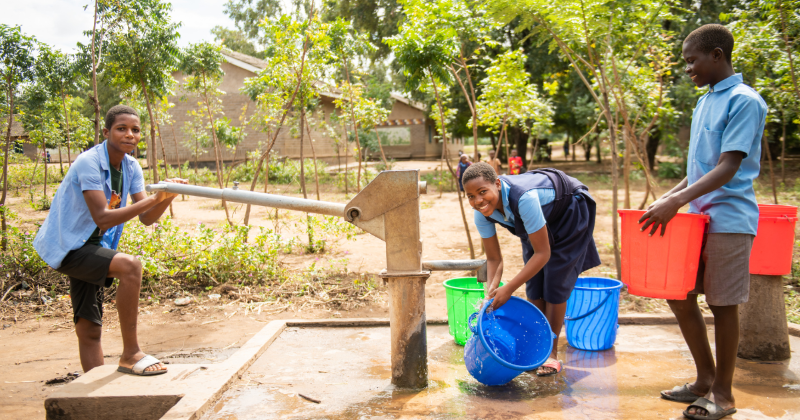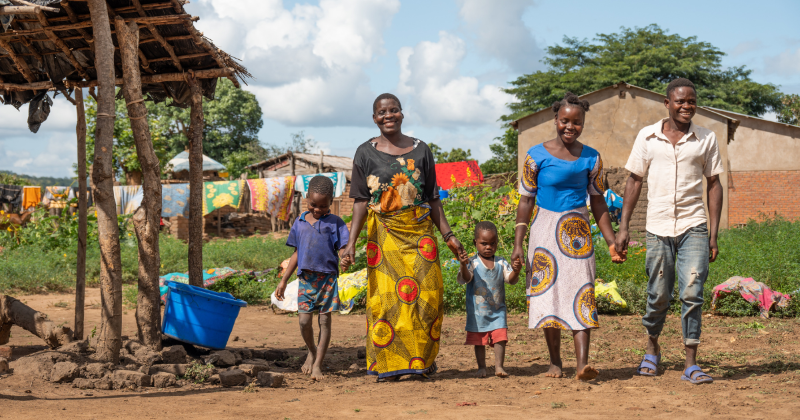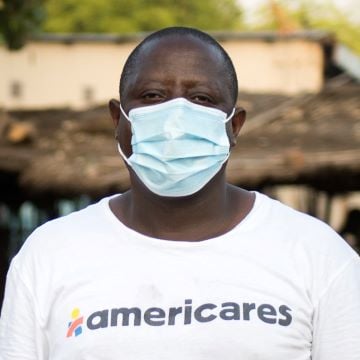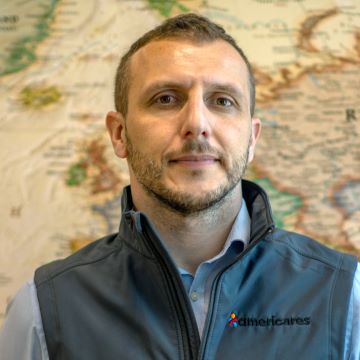Xylem Watermark and Americares: Helping Youth Tap into a Better Future
Through infrastructure improvements and education in Malawi, Americares and Xylem helped thousands of young people bring lasting, positive change to their communities.
In Malawi, a small, landlocked country in southeastern Africa about the size of Pennsylvania, just under half of the 17.6 million population are between the ages of 10 and 35. These young people are agents of change and powerful allies in changing behaviors.
Americares is a global non-profit organization focused on health and development that respond to individuals affected by poverty, disaster, or crisis. Since 2020, Xylem Watermark has been supporting Americares work with rural communities in Malawi to strengthen and expand access to basic water, sanitation, and hygiene (WASH) services. Working in remote and underserved areas near Majete Wildlife Reserve and Liwonde National Park, Americares collaborated with local authorities, the Ministry of Health, the nonprofit conservation organization African Parks, and the local community.
Making Waves recently spoke with Americares Akuzike Tasowana, project manager, and Matteo Cinquemani, Americares technical advisor for water, sanitation, and hygiene, about the organization’s work with youth in Malawi.
Q: What is the goal of and concept behind the student clubs in schools?
Matteo: The goal of our infrastructure improvements and rehabilitation interventions is to ensure adequate services for users. So, when we built handwashing facilities at schools, we worked with students, teachers, and principals to raise awareness on how to run and maintain this infrastructure. This combination of engagement, ownership and technical knowledge makes a real difference. The results are sustainable; education on how to operate and maintain ensures that the facilities are used on a long-term basis.
Akuzike: Before Americares constructed handwashing stations in the schools, students had to fetch water for drinking, handwashing, cooking and cleaning from communal sources, which was challenging and took time away from school. Now, students use the new handwashing facilities and see the benefits daily. The use of handwashing stations has helped prevent diarrheal diseases, reducing absenteeism. Students organize themselves to ensure water is always available at each station and to keep the facility clean. If someone is misusing or damaging a handwashing station, all the other children at once point that out.
“When we built handwashing facilities at schools, we also worked with students, teachers, and headmasters to raise awareness on how to operate and maintain this infrastructure. That makes a real difference.”
Q: How did you decide where to form youth clubs and what topics will be covered?
Akuzike: Youth clubs are separate from the schools - in many cases, members are usually older than school students. but still linked to the schools – and are in the same communities where Americares is implementing other Xylem projects. This gives young people opportunities to pass on the information they learn in the clubs to their households and villages. In the Majete area, we had twenty youth clubs with ten members each. We worked specifically on sanitation clubs with school children, whereas Youth Groups have a broader role in their communities and do a lot of work in mobilizing and engaging community members on a range of different topics, including of course WASH and Health.
The topics for the youth club were selected based on challenges faced by the general population in the area. For example, all the youth clubs in the Majete area wanted to train in cholera prevention because the area is prone to the disease due, in part, to flooding. The young people also expressed an interest in training around water treatment and safe management of solid waste, because they know that some diseases in the communities are a result of poor solid waste management and handling of drinking water. They used what they learned during clean village competitions.
Akuzike: Americares developed these clean village competitions to engage local communities and motivate people to improve their living conditions and overall well-being. We conducted the competitions in villages in the Liwonde and Majete areas. First, alongside the Health Surveillance Assistants (HSA), we conducted baseline surveys and counted the number of existing latrines, handwashing stations, drop-hole covers, and tippy taps (handwashing stations) with soap, for example. Youth club members spread information, such as the benefits of having latrines and washing hands.
At the end of the competition, we returned with village health committees to measure progress. The winners were identified based on the increase in latrines, tippy taps, drop-hole covers, and other factors. We presented awards – the winners received resources to further improve WASH in their communities.
“Young people are powerful allies when it comes to changing existing practices and promoting new ideas, habits, and behaviors. Whether it is schoolchildren or youth groups, they can act as champions and transfer knowledge to their families and communities.”
Q: Why is it so important to engage youth and young adults in these efforts?
Matteo: Young people are powerful allies when it comes to changing existing practices and promoting innovative ideas, habits, and behaviors. Whether it is schoolchildren or youth groups, they can act as champions and transfer knowledge to their families and communities. By supporting and mentoring them, we accelerate these processes of change. There is also an exchange of ideas in the opposite direction, which helps us adapt and improve our method.
Another essential element is the innovative contribution that these youths bring to the table. Xylem gave us the opportunity to partner on a couple of their innovation initiatives, the Hackathon and the Global Student Innovation Challenge, to tackle some real-life issues that affect rural communities throughout Malawi. Students came up with innovative solutions. This is a great form of collaboration, which once more reinforces the importance of building partnerships, engaging all actors, and working together to achieve the best results possible.
Akuzike: The ongoing support from Xylem has made it possible to empower young people with WASH education and sensitization campaigns such as clean village competitions and water treatment campaigns. These help to prevent the transmission of communicable diseases, such as cholera and diarrhea, with many students involved in the maintenance of water improvements in schools.

“The ongoing support from Xylem has made it possible to empower young people with WASH education and sensitization campaigns such as clean village competitions and water treatment campaigns.”

Through this program, we are aiming to bring lasting, positive change to more communities in Malawi by the end of this year. HSAs (Health Surveillance Agents). We are working in the Chikwawa District to deliver training, community education, and sensitization campaigns to youth WASH clubs and HSAs, and establish clean village competitions. We hope to extend our work in supplying WASH solutions for other communities and open new opportunities for skills-based volunteering across the Xylem network.
For more on Xylem Watermark’s work with Americares and other partners to serve communities around the world, visit xylem.com/watermark. You can learn more about Xylem’s Global Student Innovation Challenge, and get involved in future programming here.



